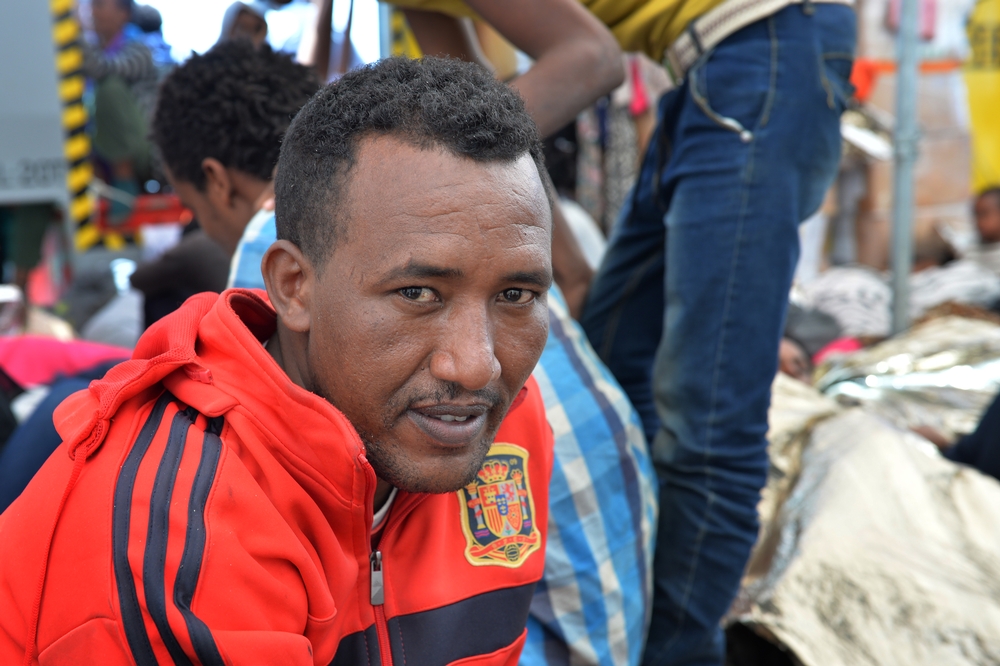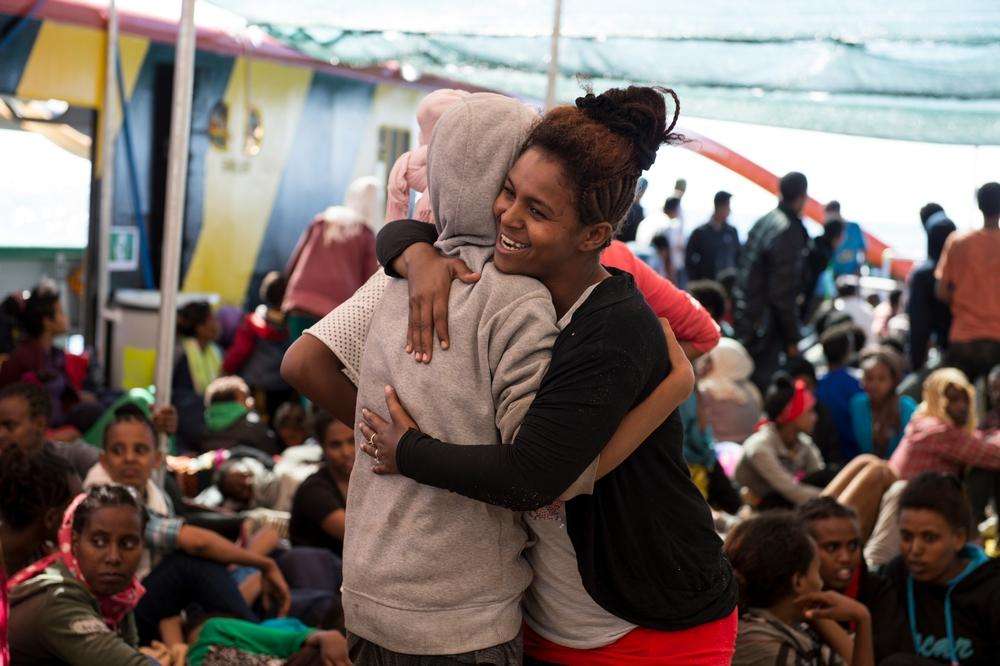From January through mid-May of 2015, more than 35,000 migrants fleeing violence and privation in their home countries crossed the Mediterranean between North Africa and Italy. Most experience terrible conditions during their voyage. In response to the urgent need for maritime search-and-rescue operations, Doctors Without Borders/Médecins Sans Frontières (MSF) teams are working onboard two ships, the MY Phoenix (operated jointly with Migrant Offshore Aid Station) and the Bourbon Argos, to provide medical assistance ranging from primary care to resuscitation and advanced life support. Here, patients rescued by the Bourbon Argos on May 13 tell their stories. All Photos © Julie Remy

Freweini, from Eritrea:
“My name is Freweini. I’m 38 years old, and I come from Eritrea. My husband is dead, but I have five children—three of my own, and two others I take care of—and a sick mother. Since I left Eritrea two months ago, I haven’t talked to any of them.
Three years ago I started having back problems. Before that, I could run everywhere and do whatever I wanted. Now I can barely walk. I have to use crutches and every day it is painful.
I need to have surgery for my back. I tried to get the treatment at home, but they didn’t have what was needed—or not unless I could find $30,000. So instead I turned to traditional medicine, where they used fire. But it didn’t remove the pain—all it did was burn my skin. Now I have marks everywhere on my body.
Because of my back problems, I decided to find a way to leave Eritrea. The local shopkeepers and others in my village helped me collect enough money to pay for the trip to Khartoum, and then on to Libya. I set out on my own, walking with my crutches. I walked to Khartoum, and then I took a pick-up truck from Khartoum to Libya, where I boarded a boat.
I’ve been helped by people all along the way. Everyone has been so helpful—lifting me up when needed, even carrying me. I‘m very grateful to all of them.
When I got on the boat, I had no idea how long it would take. Then you came and rescued us. I don’t care which country I go to in Europe. All I want is to have surgery on my back, and be able to help my children. I hope I’ll be able to walk normally again soon.”

Tufay Basfil, from Eritrea:
“My name is Tufay Basfil and I’m from Eritrea. I’ve been on the road for five years in a bid to escape my country's military regime. In Eritrea, everyone has to do military service, which never ends. Officially we must serve 10 years—but even after 10 years, it may not end. There’s no proper salary, we get about $10 per month—not even enough to feed our families.
I left Eritrea on my own and traveled on foot to Camp Number 26, just over the Eritrean border in Sudan. The refugee camp contains only Eritreans. I stayed there for five years. As soon as the police found out that someone was working, they would ask for bribes and money, so eventually I decided to leave.
It took us seven days to get from Sudan to the Libyan border. There were about 30 of us in a pick-up truck. The driver was going very fast and two people fell off, but he didn't even stop. Lots of people died along the way.
Near Benghazi, we were stopped and questioned by Libyan militiamen, who were beheading non-Muslims.
Once in Tripoli, waiting for a boat that would take me to Europe, I was imprisoned for five months by people smugglers. If anyone dared to ask for anything, the smugglers would give us electric shocks or shoot in the air right above our heads, so the bullets fell back down around us. Others would beat us or burn us.
Once a day, we were given one small portion of pasta to share between 10 men. There wasn’t enough, and some of us didn’t even get one noodle. The only water we had to drink was foul and salty.
It was very violent in Libya. Even if women were pregnant, they didn't care. One woman lost her three-year-old child just three days before we got on the fishing boat.
All I want is to live in peace.”
Migrant Crisis in the Mediterranean: "They See No Other Way"
Anonymous Man, from Bangladesh:
“I am so relieved and happy to have left Libya. If I had known that things would turn out the way they did, I would never have gone there.
For the past three years, I had been washing dishes for an oil company in the Libyan desert to help my family back home. About a year ago, things took a turn for the worse. With the arrival of armed militias, businesses started to shut down. The militias were stealing all they could from people, and killing them. It got so bad that we became afraid to go out.
The company I was working for had organized the trip for me to get into Libya, but they shut down a month ago when things became too dangerous. At about that time, some Bangladeshis were kidnapped, and I became very afraid. I realized that I had no choice: it was time to leave.
I knew the boat trip was risky, but I had no other way to leave Libya. I don’t have my papers anymore, so I couldn’t just fly back home.
There are 18 of us Bangladeshis here on the Bourbon Argos. I am sure I will find work in Europe to support my family.”

Samyawit Habutu, from Eritrea:
“My name is Samyawit Habutu and I am 23 years old. Six years ago I was forced to serve in the Eritrean army. They wouldn’t let me out even after I became pregnant and gave birth to my daughter.
A year ago, in June 2014, I decided I had to leave. Leaving my daughter with her grandmother in Eritrea, I travelled first to Shagarab refugee camp in Sudan, where I stayed for ten days. Then I traveled on to Libya, which took another ten days.
Along the way three people fell from the pick-up truck. One broke his leg, and the other two died. The driver just pushed the bodies to the side of the road and continued on his way.
In Tripoli, I had to wait for three more months. Each and every night while I was there, a Libyan man would select two girls to have sex with at gunpoint. One friend of mine caught AIDS and became pregnant from that same Libyan man—she is now quite sick in Switzerland.
Right now, I only want freedom, a job, and the chance to send money back to my family. I’d like to work with computers, and find some office work.
If I knew then what I know now, I would never have made this trip. People with lots of family responsibilities and problems shouldn’t attempt this trip—only the young survive it.”
Migrants in the Mediterranean: "I Had to Leave; I Had No Choice"
Anonymous Man, from Eritrea:
“Nearly two years ago, I fled from Eritrea, where I was doing military service near Asmara. I made my way to a refugee camp, in Ethiopia, where I stayed for 15 months. After that, I went to Sudan, where the border police caught me and returned me to Ethiopia.
I was beaten by both the Sudanese and Ethiopian police. The Sudanese police took all my money and other possessions—they said it was because I was Christian.
After a few days, I returned to Sudan. This time I was arrested by the Rashida people, who said I had to pay $2,500, and they raped a woman who was with me.
My family in Eritrea had to collect together enough money to pay the ransom, to save me from being killed. I remained with the Rashida for a month, until I was released in Khartoum, where a kind man gave me food, clothing, and the chance to communicate with my relatives in Eritrea.
Three weeks later I made my way to Libya, via the Sahara. On the first day of the journey we were robbed, and the women with us were raped. After three days, we crossed into Chad, where the Chadian military took the four cars in our convoy. I jumped out and spent two days and two nights in the desert, without food or water.
After two days walking, I reached a Libyan border town. On the way, the Libyans killed five men who were with me for crossing the border illegally. After that, I worked for one month for a man who took people to the sea, and then I was free to continue to the coast.
At the coast, I boarded a ship, where the police caught me and arrested me for working for a people smuggler. They took me to a police station, beat me, and half-starved me for a week. I escaped from that prison, and managed to get a place on the boat that was rescued by MSF.
Most of my companions are still held in Libyan prisons, in dreadful conditions. Some of them are dead. Altogether I saw seven men die on my journey here.”




